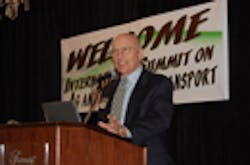WASHINGTON – The desire to improve food security in the U.S. is more than likely to become a major federal government initiative when the Obama administration takes office next month. That’s going to pose some serious challenges for truckers that serve the U.S. agricultural industry, according to experts here at the second annual International Summit on Agricultural and Food Truck Transport.
“We know how security initiatives affected the airline industry – but we’ve seen only the tip of the iceberg when we talk about food security and transportation,” said Charles “Shorty” Whittington, president of agricultural hauler Grammer Industries and chairman of the American Trucking Assns (ATA). “It will be a challenge for the transportation sector to keep up with food security initiatives.”
The two main features of a food security push that will impact truckers the most revolve around transparency and traceability, said Clayton Yeutter, senior advisor for international trade at the law firm of Hogan & Hartson LLP and a former U.S. Secretary of Agriculture.
(Continued)
“Before long I expect ‘traceability’ to become mandated, to help track food stuffs wherever they go,” he said. “A lot of people may not like that, but it will be a major part of food security efforts. The world is much more interconnected now and trade – both in agricultural and non-agricultural goods – will be critical to our recovery. Remember the U.S. only has a population of 300 million – that’s minute compared to the global population of 6.7 billion. That means most of our customers will be outside our borders. And to be internationally competitive, we need efficient transportation.”
It’s not just that transportation efficiency may be harder to achieve as food security initiatives translate into regulations. Transportation as a whole seems to be getting shorter shrift in the U.S. compared to other developed nations, said Gene Griffin, director of the Upper Great Plains Transportation Institute.
“A lot of other countries have more appreciation for mobility and how it supports their socio-economic systems than we do,” he stressed. “Our challenge is how to get transportation and mobility issues into the front pew of public policy – because we’re usually in the back pew, behind things like healthcare and education. But the fact is without mobility and transportation, none of them is possible. That’s why we must elevate the role mobility and transportation play in our society.”
About the Author
Sean Kilcarr
Editor in Chief
Sean Kilcarr is a former longtime FleetOwner senior editor who wrote for the publication from 2000 to 2018. He served as editor-in-chief from 2017 to 2018.
